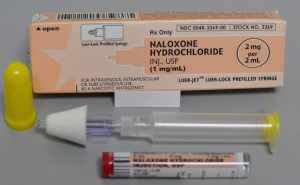

MedFriendly®


Naloxone Hydrocholoride (Narcan)
Naloxone hydrochloride is a drug that acts against the
effects of endorphins and narcotics. Endorphins are
chemicals made by the body that cause a pleasant
feeling. Narcotics are substances/drugs that relieve pain
and cause feelings of pleasure. Because naloxone
hydrochloride works against endorphins and narcotics, it
is known as a narcotics antagonist. An antagonist is
something that goes against or opposes something else.
FEATURED BOOK: Pain Free: A Revolutionary Method for Stopping Chronic Pain
Naloxone hydrochloride is very effective and is prescribed to reverse acute (sudden)
narcotic intoxication or narcotic depression. Narcotic intoxication is when someone has
taken too much narcotics to the point that it is harmful. Narcotic depression refers to the
slowing down of the central nervous system (brain and spine) due the effects of
narcotics.
Naloxone hydrochloride does not have any helpful effect if it is administered without
narcotics in the blood. When it is given to a narcotics-dependent person, it does have
some side effects associated with narcotics withdrawal (being without narcotics after
being addicted to it), such as nausea, vomiting, and sweating. Some people cannot take
this drug because they are too sensitive to it. The full chemical name for naloxone
hydrochloride is 1-N-Allyl-7, 8-dihydro-14-hydroxymorphinone hydrochloride. By looking at
the parts of this chemical name that are in italics, you can see how the name "naloxone"
was created. Naloxone hydrochloride is sometimes referred to as naloxone but it is
marketed under various trade names such as Narcan, Narcanti, and Nalone. It has
sometimes mistakenly been referred to as naltrexate.
"Where Medical Information is Easy to Understand"™















